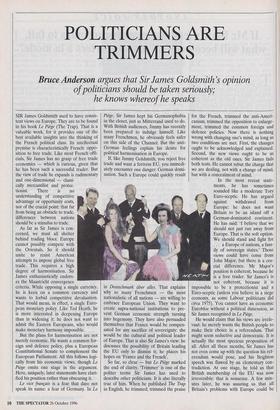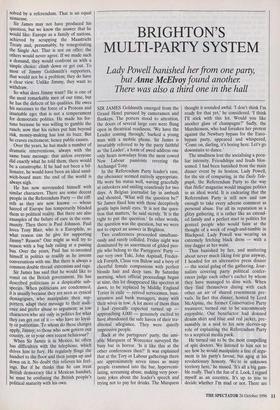POLITICIANS ARE TRIMMERS
Bruce Anderson argues that Sir James Goldsmith's opinion
of politicians should be taken seriously; he knows whereof he speaks
SIR James Goldsmith used to have consis- tent views on Europe. They are to be found in his book Le Piege (The Trap). That is a valuable work, for it provides one of the best available insights into the thinking of the French political class. Its intellectual premise is characteristically French: oppo- sition to free trade. Like most French offi- cials, Sir James has no grasp of free trade economics — which is curious, given that he has been such a successful trader. But the view of trade he expands is rudimentary and one-dimensional — classi- cally mercantilist and protec- tionist. There is no understanding of competitive advantage or opportunity costs, nor of the crucial point: that far from being an obstacle to trade, differences between nations should be a stimulus to trade.
But the plans for harmonisation are not merely economic. He wants a common for- eign and defence policy, plus a European Constitutional Senate to complement the European Parliament. All this follows logi- cally from his economic views, though Le Piege omits one stage in the argument. Here, uniquely, later statements have clari- fied his position rather than obscuring it.
Le vice francais is a fear that dare not speak its name: a fear of Germany. In Le Piege, Sir James kept his Germanophobia in the closet, just as Mitterrand used to do. With British audiences, Jimmy has recently been prepared to indulge himself. Like many Frenchmen, he obviously feels safer on this side of the Channel. But the anti- German feelings explain his desire for political harmonisation in Europe.
If, like Jimmy Goldsmith, you reject free trade and want a fortress EU, you immedi- ately encounter one danger: German domi- nation. Such a Europe could quickly result in Deutschmark uber dies. That explains why so many Frenchmen — the most nationalistic of all nations — are willing to embrace European Union. They want to create supra-national institutions to pre- vent German economic strength turning into hegemony. They have also persuaded themselves that France would be compen- sated for any sacrifice of sovereignty: she would be the cultural and political leader of Europe. That is also Sir James's view: he discusses the possibility of Britain leading the EU only to dismiss it; he places his hopes on 'France and the French'.
So far, so clear — but Le Piege marked the end of clarity. 'Trimmer' is one of the politer terms Sir James has used to describe other politicians. It is also literally true of him. When he published The Trap in English, he trimmed; trimmed the praise for the French, trimmed the anti-Ameri- canism, trimmed the opposition to enlarge- ment, trimmed the common foreign and defence policies. Now there is nothing wrong with changing one's mind, as long as two conditions are met. First, the changes ojtght to be acknowledged and explained. Second, the new views ought to be as coherent as the old ones. Sir James fails both tests. He cannot rebut the charge that we are dealing, not with a change of mind, but with a concealment of mind.
In the most recent state- ments, he has sometimes sounded like a moderate Tory Euro-sceptic. He has argued against withdrawal from Europe: he does not want Britain to be an island off a German-dominated continent. He has said: 'I believe that we should not just run away from Europe. That is the soft option. We should stand and fight for . . . a Europe of nations, a fam- ily of sovereign states.' Those views could have come from John Major, but there is a cru- cial difference. Mr Major's position is coherent, because he is a free trader. Sir James's is not coherent, because it is impossible to be a protectionist and a Euro-sceptic (unless you believe in a siege economy, as some Labour politicians did circa 1975). You cannot have an economic Eurobloc without a political dimension, as Sir James recognised in Le Piege.
He would claim that his views are irrele- vant; he. merely wants the British people to make their choice in a referendum. That might seem seductive and democratic. It is actually the most specious proposition of all. After all these months, Sir James has not even come up with the question his ref- erendum would pose, and his Brighton speech was flawed by an elementary con- tradiction. At one stage, he told us that British membership of the EU was now irreversible: that is nonsense. A few min- utes later, he was assuring us that all Britain's problems with Europe could be solved by a referendum. That is an equal nonsense.
Sir James may not have produced his question, but we know the answer that he would like: Europe as a family of nations, achieved by scrapping the Maastricht Treaty and, presumably, by renegotiating the Single Act. That is not on offer; the others would never agree. If we made such a demand, they would confront us with a simple choice: climb down or get out. To most of Jimmy Goldsmith's supporters, that would not be a problem; they do have a clear view. Unlike Jimmy, they want to withdraw.
So what does Jimmy want? He is one of the most remarkable men of our time, but he has the defects of his qualities. He owes his successes to the force of a Protean and insatiable ego; that is not a temperament for democratic politics. He made his for- time because he was willing to gamble the ranch; now that his riches put him beyond risk, money-making has lost its buzz. But he craves excitement; hence public causes.
Over the years, he has made a number of dramatic interventions, always with the same basic message: that unless everyone did exactly what he told them, there would be a catastrophe. If he had not been a bil- lionaire, he would have been an ideal sand- wich-board man: the end of the world is always nigh. He has now surrounded himself with similar characters. There are some decent people in the Referendum Party — the riff- refs as they are now known — whose hatred of Europe has temporarily blinded them to political reality. But there are also examples of the failure of care in the com- munity. Then there is Paul Johnson. Paul loves Tony Blair, who is a Europhile, so what reason can he give for supporting Jimmy? Reason? One might as well try to reason with a bag lady railing at a passing bus. Over the years, Paul has re-invented himself in politics as readily as he invents conversations with me. But there is always a common double thread: extremism and rage.
Sir James has said that he would like to vomit on the British government. He has described politicians as a despicable sub- species. When politicians are condemned, it is usually because they are seen as cynical demagogues, who manipulate their sup- porters, adapt their message to their audi- ence and prefer abuse to argument; as low characters who are only in politics for what they can get out of it — who have no loyal- ty or patriotism. To whom do these charges apply, Jimmy; to those who now govern our country, or to your own recent behaviour? When Sir James is in Mexico, he often has difficulties with the telephone, which drives him to fury. He regularly flings the handset to the floor and then jumps up and down on it. No doubt this relieves his feel- ings. But if he thinks that he can treat British democracy like a Mexican handset, he must be confusing the British people's political maturity with his own.



















































































 Previous page
Previous page